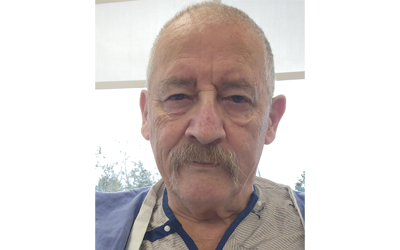When amateur blues musician Warren Bourgeois was diagnosed with Parkinson’s disease (PD) in 2013, he remained calm and researched as much as he could about the condition. He was able to take this approach because of the great, all-encompassing care his wife provides. “My wife is my main source of strength to deal with Parkinson’s,” he says. The former professor of philosophy took an action-oriented approach to this new challenge, learning about the multitude of ways to manage Parkinson’s, including through physiotherapy and meditation. However, Warren says that the all-consuming nature of his study of Parkinson’s led him to be too inward looking, neglectful of his loving wife and family at times. “There is an important difference between keeping a clear focus on adaptation and being obsessive,” he says. “It is critical to live as the same old person you used to be with some additional problems, rather than to live as a problem.”
Warren also found that PD made him feel socially awkward, with so much of his energy and time being internally directed. His wife and good friends pulled him through the times when he folded up emotionally. Compounding this lack of social ease was his profound facial masking (also known as hypomimia), which he found exacerbated his awkwardness when he was not among family and friends.
Fortunately, Warren turned to the Parkinson’s community for another safe kind of social situation in which he could practice social skills, and he found it in the form of The Book Shakers, a virtual PD book club, which he facilitates. The sense of camaraderie and understanding amongst the members ensures that everyone feels welcome, no matter where they are with their Parkinson’s symptoms. “For example, someone might offer an interesting insight into the development of a character in a novel while moving around in an unusual way [due to dyskinesia],” Warren says. “Nobody would remark on [this] among the Book Shakers – at times, [this] club is like a support group.”
Warren’s life also changed following his Deep Brain Stimulation (DBS) surgery, which he says has enabled him to better connect with others and be there for his loved ones who are always there for him. He is delighted to smile in photos again, having seen a dramatic reduction in his facial masking post-surgery. He is also more present in social situations.
Warren wishes people knew that PD symptoms can vary dramatically, even from one hour to the next, and that it does not affect everyone in the same way. “A cab driver once accused me of faking it when I was walking almost normally after shuffling along previously,” he says.
When asked what advice he would give to someone who is newly diagnosed with Parkinson’s, Warren emphasizes the importance of a good healthcare team comprised of family caregivers, a physiotherapist, neurologist, family doctor, and speech-language pathologist. A neurosurgeon may be needed, too. He also cautions against falling for “miracle cures,” often advertised on the Internet. “The flavour of the week always comes with huge promises and, usually, an enormous price,” Warren says. “Run things by your family, neurologist and your support group.” He also suggests padded shorts, usually made for skaters and skiers, for those prone to falls. He advises that Parkinson’s is not a death sentence, and encourages everyone to talk to people who live good lives with PD. Finally, “Remember to return the great love given selflessly by caregivers at home.”







